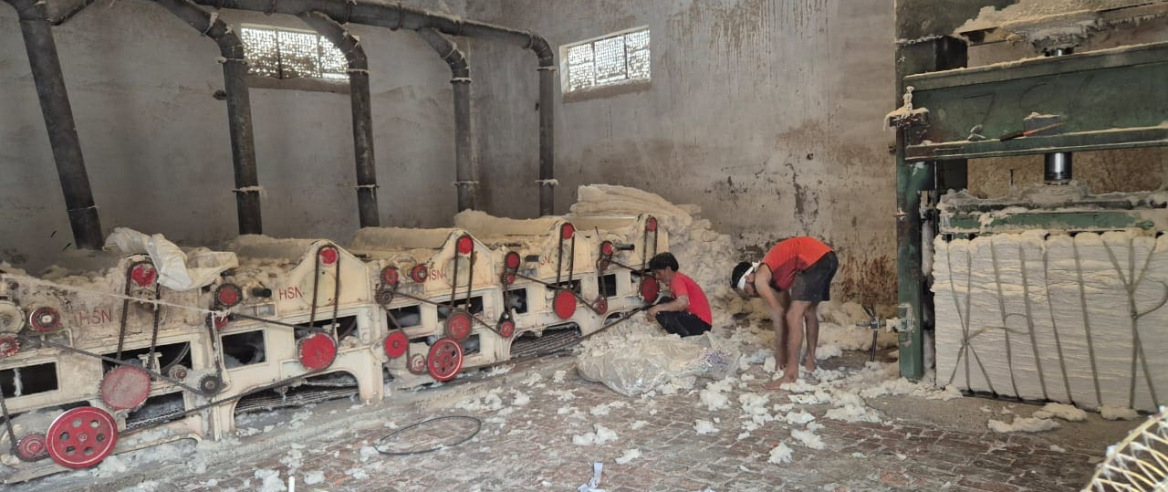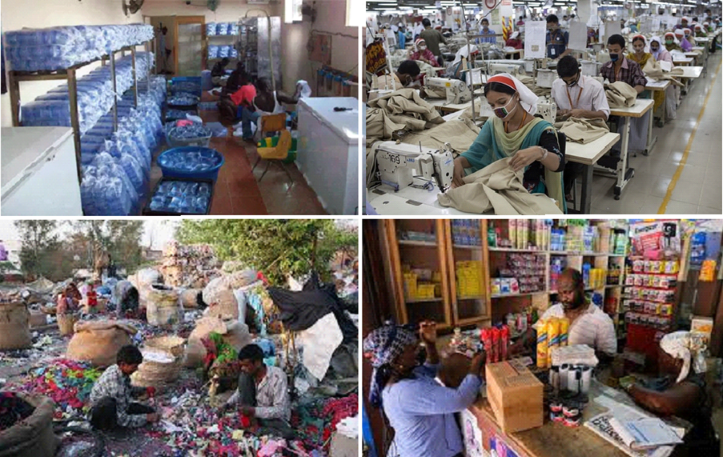Building Empathetic Agility: The Leadership Muscle for Navigating Complexity with Purpose
Empathetic agility is the ability to adapt strategically and maintain momentum, while genuinely considering the experiences of others.

Across industries and geographies, multinational corporations, philanthropic foundations, and development agencies are funding sustainability initiatives aimed at transforming supply chains in low- and middle-income countries (LMICs). The underlying intent of these initiatives is to help suppliers and producers transition toward practices that are both environmentally/socially responsible and economically viable.
These efforts can focus on several key areas, including: promoting decarbonization technologies and circularity, replacing toxic chemicals with safer alternatives, improving water efficiency, advancing worker well-being and gender equity, and building capacity for a just transition and compliance with evolving buyer standards.
These initiatives often share a common playbook. They begin by piloting solutions with larger or well-resourced suppliers, as they are often easier to engage, have technical resources, and can demonstrate proof of concept. Support typically includes technical guidance, financing, and training to catalyse adoption. This is often complemented by creating an enabling environment through policies, regulation, and enforcement. The underlying assumption, drawn from the Diffusion of Innovation Theory is that success with these innovators and early adopters will naturally “trickle down” to the mainstream market and smaller suppliers, including small and medium enterprises (SMEs), which form the bulk of LMIC supply chains (See figure 1 below).

In practice, this diffusion rarely happens. Across industries, many initiatives become trapped in what we call the “pilots that never fail but never scale” phenomenon – projects that generate promising results with a few early adopters but struggle to take root across the broader supply chain. The core issue is that the majority of suppliers look very different from those early adopters. While large suppliers have the resources, margins, and motivation to experiment with new practices, most SMEs sit on the other side of ‘the chasm’, unable to adopt solutions in the same way.
The reality is stark – the necessary shifts towards cleaner production, safer chemicals, water efficiency, and better labor practices, to name a few, will not happen without the participation of SMEs, and they remain the hardest actors to move.
Through our work, FSG has engaged thousands of SMEs across sectors in Asia and Sub-Saharan Africa—from individuals collecting waste or selling essential products, to small manufacturing units operating out of shops or residential spaces, to family-run factories and distribution businesses.
We have observed that most SMEs in these relevant industries typically fall into three groups:
Our experience suggests that across industries and geographies, SMEs face unique constraints but also possess distinct strengths. Program design needs to be tailored for both. Recognizing this challenge is the first step toward designing interventions that work. The question then becomes: Why do SMEs need a different approach?

For most SMEs, every decision is shaped by immediate operational realities. Limited margins and cash flow pressures mean they cannot adopt new practices unless they yield tangible and immediate business benefits, such as reduced input costs, efficiency gains, or access to new buyers. Many programs do not account for this pressure. They may lead with environmental or social impact messaging or rely on regulatory compliance as the primary motivator. They may also promote capital-intensive technologies that only pay back over several years, assuming SMEs can absorb upfront costs.
For example, textile manufacturers frequently cite the lack of purchase guarantees from brands as a barrier to adopting new sustainable practices—they need assurance of buyer commitment before investing. Similarly, eco-labeling programs for Vietnamese shrimp farmers gained traction only when buyers committed to paying premiums for certification.
SMEs are likely to change when sustainability interventions deliver immediate cost savings or secure access to revenue.
Many SMEs are semi-formal. They may have some formal registration but may employ what are considered informal practices, such as cash-based transactions, verbal agreements, family networks and employees, and limited documentation. Their informal nature also makes it difficult for sustainability programs to find and track them.
Despite this, many initiatives continue offering support designed for formal operations—financing that requires collateral and documentation, compliance-heavy certification schemes, or technically complex solutions—that semi-formal SMEs cannot access or implement. Many programs respond by excluding these enterprises and creating parallel entities. We have seen this in waste and water management initiatives, where creating parallel formal enterprises—rather than working with existing informal operators—has sparked conflict and threatened livelihoods.
Programs are more likely to succeed when they adapt and provide support that works within existing informal structures rather than requiring formalization as a prerequisite or creating parallel entities.
In most SMEs, the business owners and teams juggle procurement, operations, marketing, and HR with little specialized support. With limited bandwidth and competing daily priorities, they have little mental space for new initiatives, especially ones framed as long-term transformation.
Many programs fail to account for this reality. They invest in trainings and workshops but often struggle with low attendance from decision-makers and limited follow-through. FSG’s work with SMEs across sectors (such as education and warehousing) suggests that deep, sustained engagement is required—10-20 meetings over several months to build trust with owners and managers, identify barriers together, and co-develop solutions.
Even after initial adoption, transitions are rarely one-and-done. SMEs often need ongoing support to sustain and evolve new practices, but such ecosystems are rarely accessible or affordable. Technologies and compliance requirements also change quickly, leaving SMEs hesitant to invest in what they see as a costly, endless cycle of upgrades.
Change happens when programs invest in building trusted relationships with owners and key decision-makers through persistent, hands-on engagement over months—not one-off events.
These constraints might seem daunting, but SMEs also offer distinct advantages when engaged effectively.
The key is designing interventions that account for SME constraints while leveraging these strengths.
A practical illustration comes from a global footwear manufacturer’s engagement with SME recycling centers in Southeast Asia. What began as a small pilot to recycle manufacturing scraps evolved over a decade into a closed-loop system processing millions of kilograms of material annually. By offering short breakeven timelines, maintaining regular on-the-ground engagement, and partnering with existing recyclers instead of creating new entities, the company demonstrated that sustainability could scale when programs align with SME realities and incentives.
Experiences like these underscore that scaling SME adoption is less about finding breakthrough technologies and more about how programs are designed and delivered. To move SMEs from pilot projects to scalable adoption, programming must be built with their realities in mind. Drawing on FSG’s experience, we recommend 4 key principles:
Empathetic agility is the ability to adapt strategically and maintain momentum, while genuinely considering the experiences of others.
What does 2026 mean for the future of social impact?
Achieving impact through AI will require purpose, intentional deployment, and responsible risk management.
You will also receive email updates on new ideas and resources from FSG.
"*" indicates required fields
You will also receive email updates on new ideas and resources from FSG.
"*" indicates required fields
Get updates on new ideas and resources from FSG.
"*" indicates required fields
| Cookie | Duration | Description |
|---|---|---|
| cookielawinfo-checkbox-analytics | 11 months | This cookie is set by GDPR Cookie Consent plugin. The cookie is used to store the user consent for the cookies in the category "Analytics". |
| cookielawinfo-checkbox-functional | 11 months | The cookie is set by GDPR cookie consent to record the user consent for the cookies in the category "Functional". |
| cookielawinfo-checkbox-necessary | 11 months | This cookie is set by GDPR Cookie Consent plugin. The cookies is used to store the user consent for the cookies in the category "Necessary". |
| cookielawinfo-checkbox-others | 11 months | This cookie is set by GDPR Cookie Consent plugin. The cookie is used to store the user consent for the cookies in the category "Other. |
| cookielawinfo-checkbox-performance | 11 months | This cookie is set by GDPR Cookie Consent plugin. The cookie is used to store the user consent for the cookies in the category "Performance". |
| viewed_cookie_policy | 11 months | The cookie is set by the GDPR Cookie Consent plugin and is used to store whether or not user has consented to the use of cookies. It does not store any personal data. |
